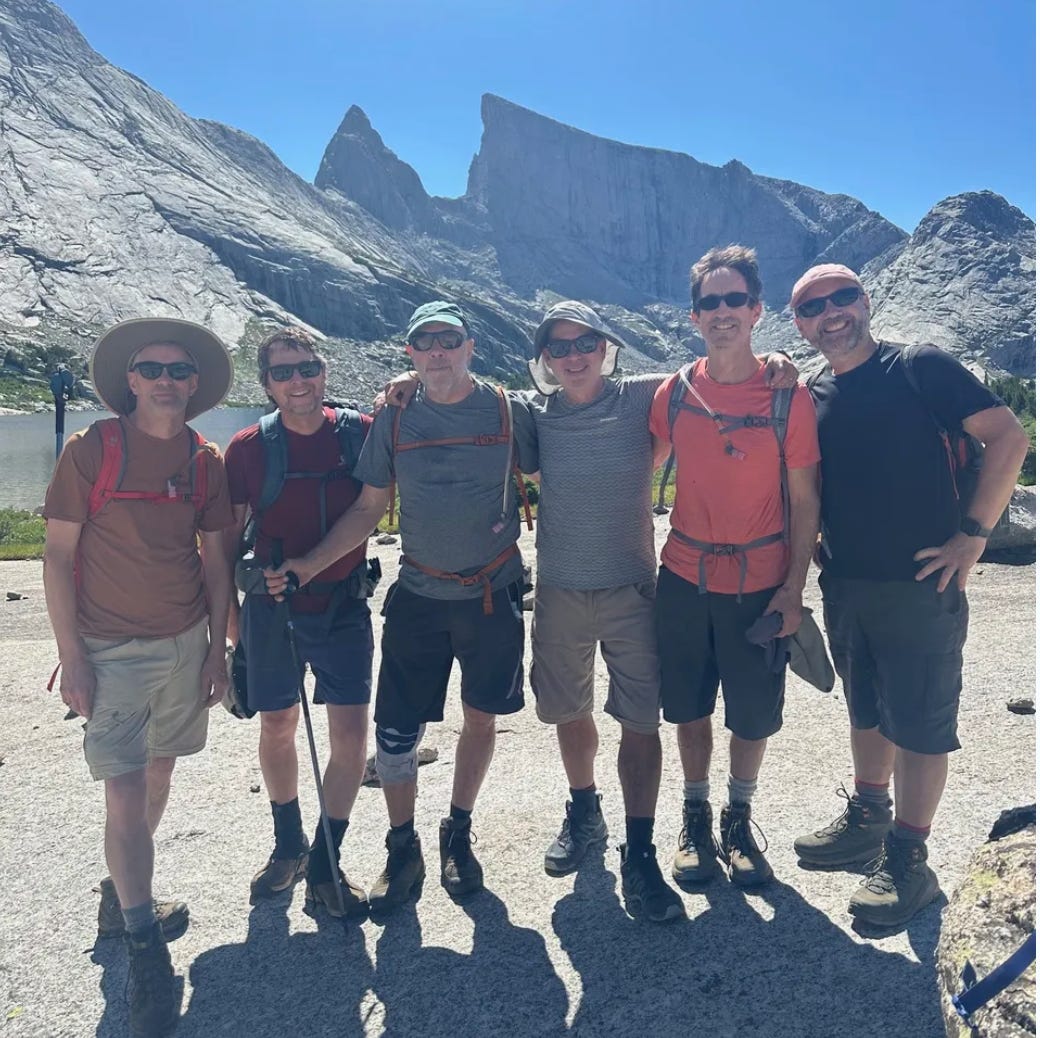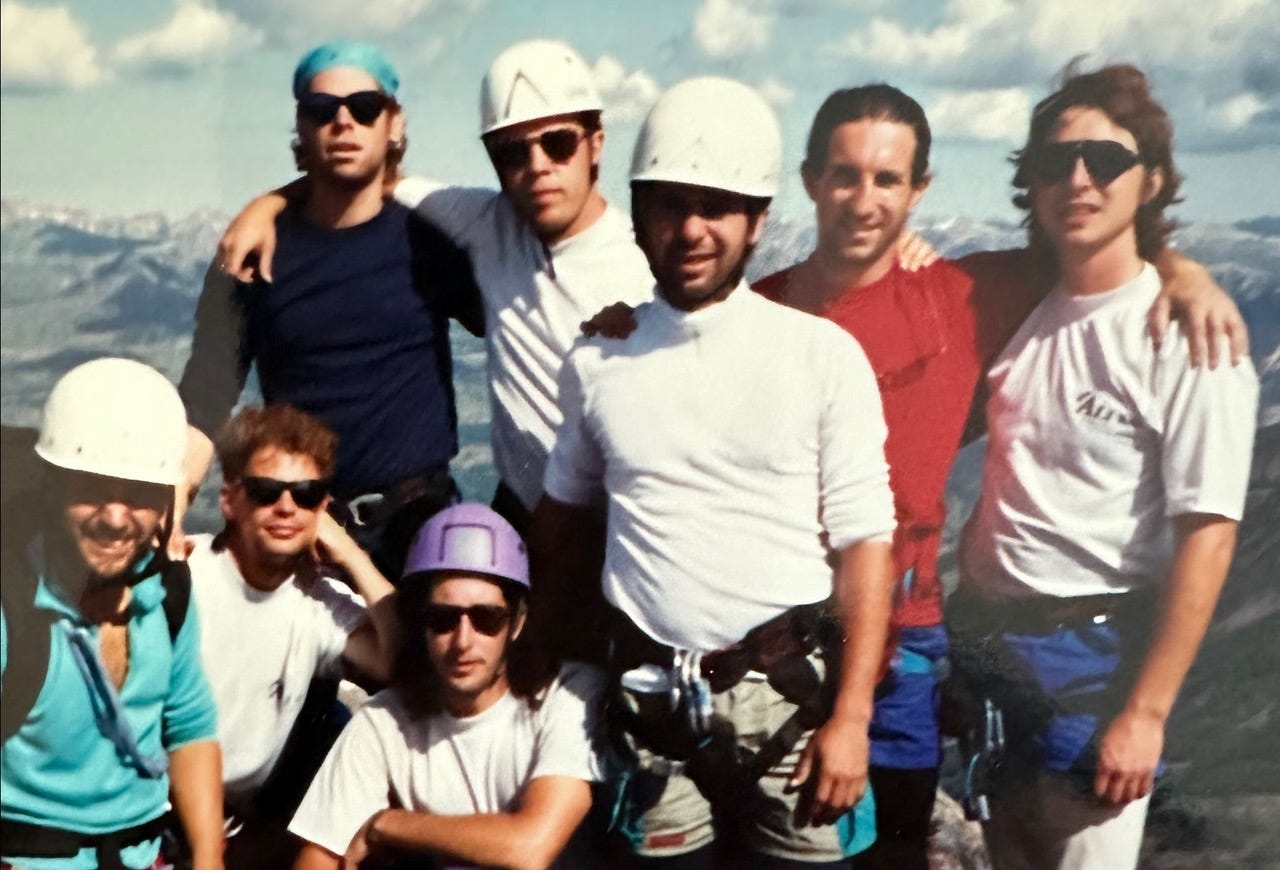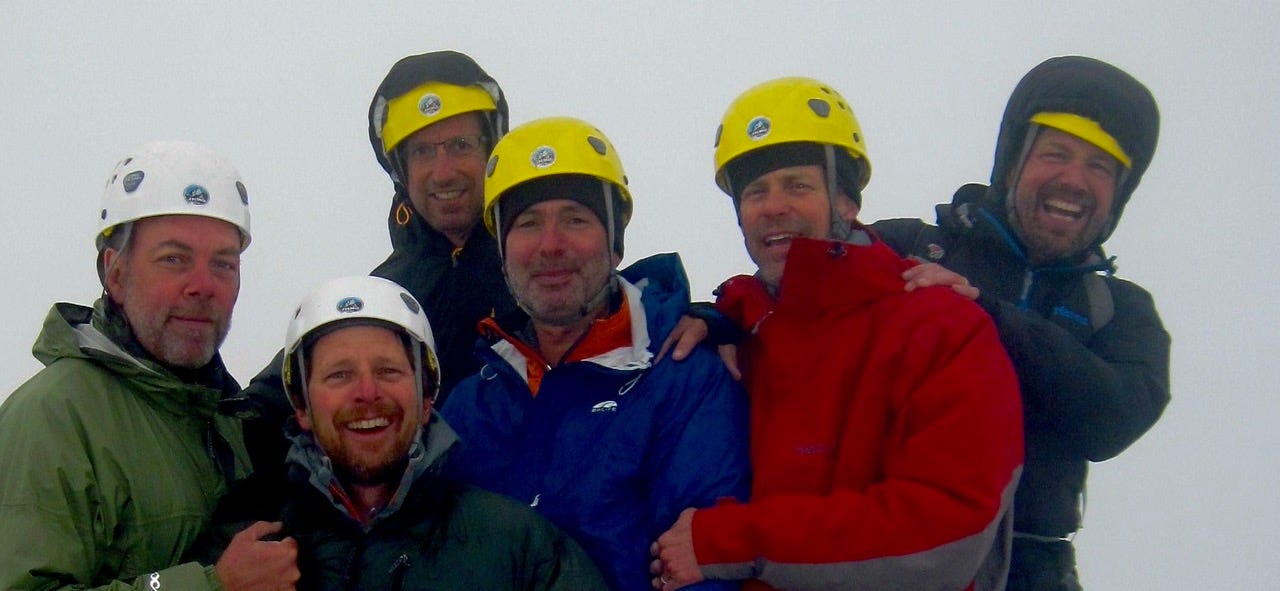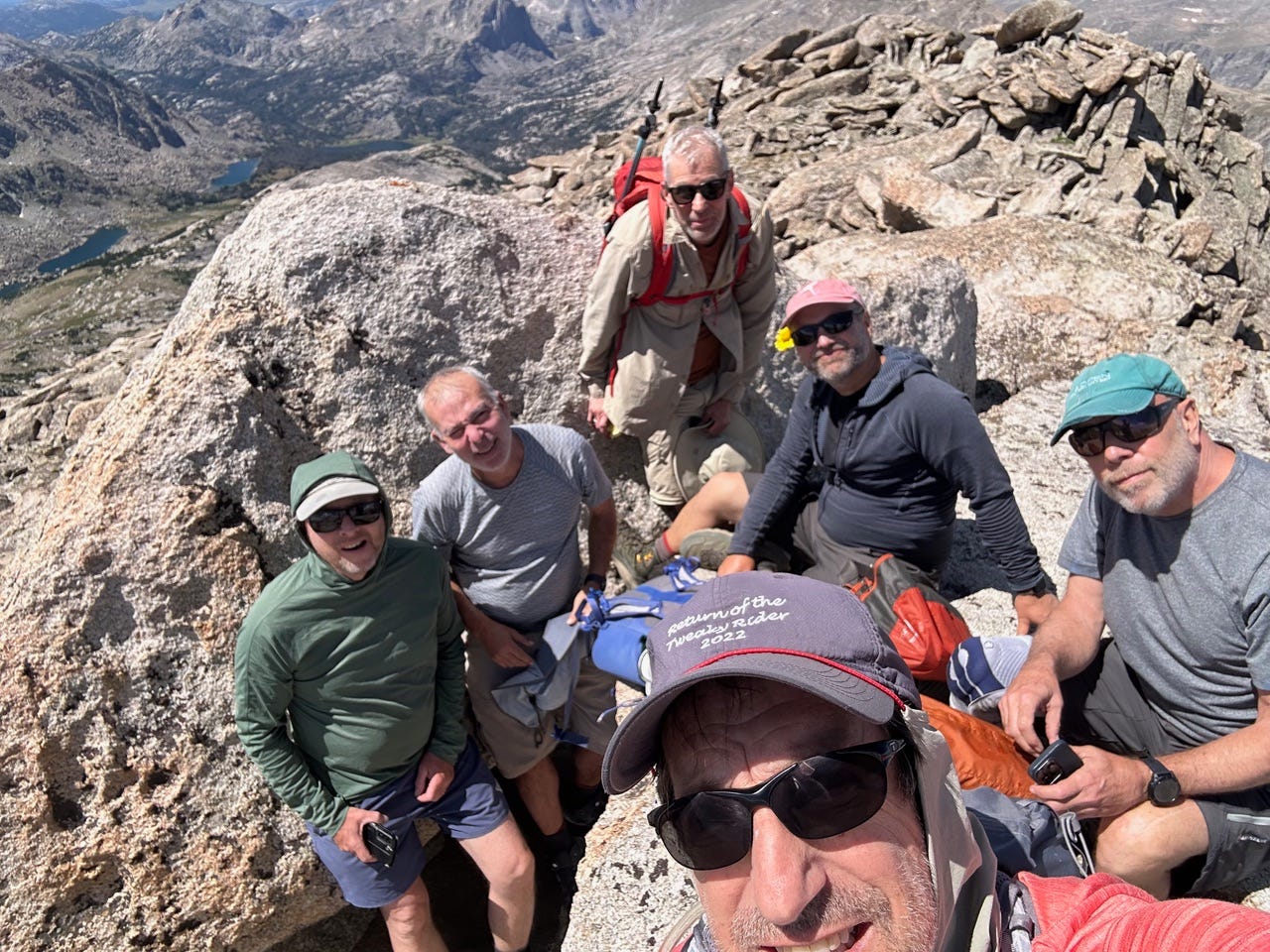Miles to Go Before We Sleep
David Begler reflects on how an annual wilderness expedition with close college buddies has evolved over 36 years—along with its participants.

The twilight ritual goes like this:
We return to our backcountry campsite, tired and sore from a long day of hiking in the mountains. We pull off our boots and sweat-stained shirts, and put on our fleeces and puffy jackets. As the sun gently retreats behind the rocks, we arrange our camp chairs into a circle. We are six scruffy men in our 60s.
Michael unscrews the lid from a steel water bottle that doesn’t contain water. Instead, it has expensive 18-year-old scotch. Carefully, he fills a plastic shot glass and passes it to the guy on his right, who passes it to the guy on his right, and so on, until it ends up in the hands of the guy sitting directly to Michael’s left. It would save a lot of time (and danger of spillage) if Michael just passed the shot to the dude on his immediate left, but this is not how the ritual goes. Everyone must touch the glass on its way to its intended recipient, who then holds it up and makes a toast: “Here’s to all my friends. Ali Bali.” Then he tips the amber whiskey into his throat and smiles at how incredibly good scotch tastes while surrounded by mountain peaks and alpine lakes at 10,000 feet above sea level. The glass gets passed back from Lars to Peter to George to Charlie to David (me) and back to Michael. Another shot gets poured and passed to the next guy in line, and another toast made.
My five college buddies and I have partaken in this ritual every summer since 1989. We call ourselves “Ali Bali,” the name derived from a nonsense song we used to sing on the trail. Each year on the first Friday of August we meet up in a mountain town like Jackson, Stanley, Bellingham, Durango, or Bishop, and spend the night in a cheap motel. The next morning we venture out of cell phone range with a week’s worth of provisions, to disconnect from our everyday lives and reconnect with nature and each other. We’ve been doing this 36 years and counting, which adds up to nearly a year of our lives.
Each year on the first Friday of August we meet up in a mountain town like Jackson, Stanley, Bellingham, Durango, or Bishop, and spend the night in a cheap motel. The next morning we venture out of cell phone range with a week’s worth of provisions, to disconnect from our everyday lives and reconnect with nature and each other. We’ve been doing this 36 years and counting, which adds up to nearly a year of our lives.
When our tradition started, we were strong and headstrong men in our mid-20s. We’d argue about how far we should hike, which of the most challenging peaks we should attempt, where we should set up camp, who was hiking too fast or too slow. There was plenty of teasing and one-upping that is the bravado of young, invincible-feeling men, putting each other down to boost ourselves up. Such was our discord that a climbing guide we once hired to lead us up a technical peak in Colorado suggested we no longer climb as a group. We ignored him.
Because despite our bickering, there was also an endless stream of laughter. Incredibly inappropriate jokes and bawdy songs coupled with a secret vocabulary of catchphrases, nicknames, and obscure references that only we got. All of this with the country’s most incredible scenery as our backdrop that held us in a perpetual state of wonder and revelation.
On each trip, we would push our bodies as hard as they would go, climbing peaks, crossing rushing rivers over fallen trees, traversing glaciers and boulder fields under the blazing sun. During the other 51 weeks of the year, we were pushing just as hard at forging our careers, looking for lasting relationships, and trying to make our marks in the world. Yet year after year, we’d come back to our little six-person universe, where needs got reduced to staying warm, fed, and safe. Where the outside world faded away and often we wouldn’t see another human for days.
When our tradition started, we were strong and headstrong men in our mid-20s. We’d argue about how far we should hike, which of the most challenging peaks we should attempt, where we should set up camp, who was hiking too fast or too slow. There was plenty of teasing and one-upping that is the bravado of young, invincible-feeling men, putting each other down to boost ourselves up. Such was our discord that a climbing guide we once hired to lead us up a technical peak in Colorado suggested we no longer climb as a group. We ignored him.
As we reached our 30s, we still managed to hold onto our youthful camaraderie, yet we had become responsible grownups with mortgages, young children, demanding jobs, and wives who were not always entirely supportive of their husbands leaving them alone with the kids for a week.
But once we got into the mountains, we were free to put all that stuff on pause. We argued less, coalesced as a group, and found our groove. We could reach our destination at the end of the day and would naturally split up to set up camp. Some guys would start pitching tents, some would go fetch water, some would arrange the kitchen. We’d take turns cooking dinners, trying to outdo each other. The scotch got passed, the miles on the trail went by, and then before we knew it, we’d be back in that mountain town where we started with a last celebratory dinner before flying back to our homes. The contrast of “out there” and our regular lives was often jarring. We’d call each other and ask “How’s your re-entry?”
For our 20th anniversary in 2008, we got flown in on a bush plane to a remote spot in Alaska with a promise from the pilot to pick us up a week later. The plane flew away just as the clouds gathered. We spent a week hiking under low visibility in a cold rain. It wasn’t until the last day when we heard the drone of the returning plane that the sky finally cleared and we could see the glorious country we had been in all along.
In our 40s and 50s, life found more ways to interfere with our plans. Some guys had to miss trips because of injury, work demands, or family situations. As we got busier, we had less time to plan trips. Even arranging a conference call became a challenge.
On each trip, we would push our bodies as hard as they would go, climbing peaks, crossing rushing rivers over fallen trees, traversing glaciers and boulder fields under the blazing sun. During the other 51 weeks of the year, we were pushing just as hard at forging our careers, looking for lasting relationships, and trying to make our marks in the world. Yet year after year, we’d come back to our little six-person universe, where needs got reduced to staying warm, fed, and safe. Where the outside world faded away and often we wouldn’t see another human for days.
Now we are all in our 60s. Our Ali Bali traditions and rituals endure, but we can’t hike as hard and long as we did in our earlier decades, and have had to make concessions. We don’t want to carry heavy backpacks, so we’ll get horses to drop our gear at a base camp, or look for trips that are hut to hut, where we can have a few more creature comforts. We started this tradition when we were single and strong, with so much ahead. Now, the conversation has turned to when people might retire, and the realization that we’d better get to our bucket list trips (Patagonia, Mt. Blanc) soon, before our bodies become less capable.
The wilderness experience has changed, too. For one, it’s much more crowded out there. Thirty years ago, there weren’t 188 REI stores encouraging people to get outdoors or YouTube videos of people hiking the remotest trails in the country. And while I don’t want to deny anyone the wonders of nature, I miss the days when we had magical alpine playgrounds all to ourselves. These days, we also have to monitor for smoke and wildfires, and often encounter scarred areas of burned trees where fire has taken its toll.
And then there’s that ever-lurking consciousness that we’re on borrowed time. There will come a trip when we pass that scotch around the circle and one person will be missing. Not because they were having a kid or attending their kid’s wedding, but because their day in the hills has come to an end. Permanently.
Now we are all in our 60s. We can’t hike as hard and long as we did in our earlier decades, and have had to make concessions. We started this tradition when we were single and strong, with so much ahead. Now, the conversation has turned to when people might retire, and the realization that we’d better get to our bucket list trips (Patagonia, Mt. Blanc) soon, before our bodies become less capable.
Back in the early 90’s, on our first trip to the Rockies in Colorado, we ran into four old men who told us that they were on an annual backpacking trip just like we were. They seemed ancient at the time, but they probably were the same age as we are now. When we met them, the idea that we might someday be old men hiking through the mountains seemed as unlikely as summiting Everest. When you’re in your 20s, you can’t fathom the idea of 40 years from now. When you’re in your 60s, you can’t fathom how those 40 years seemed to go by in a blink. But when you’re hanging out in mountains that have had 50 million birthdays, it kinda puts our own aging in perspective.
We know that, like all the adventurers and bands of brothers that have come before us, we are all just passing through. Ali Bali is a temporary phenomenon, something conjured into being each summer by six souls from all over the country who just happened to attend the same college and shared a love of the outdoors. We’ll sustain it for as long as we are fortunate enough, and then it will fade like another summer in the mountains. Until then, “Here’s to all my friends.”









For 35 years I have gathered annually with a group of six women to backpack. We are now all in our 70’s and still get together every year to hike. It is a relationship like no other. I’ve just finished a manuscript about our adventures. We call ourselves Six Women Alone after an early encounter with a man, by himself, who remarked to us after we had hiked by him “Six women, alone?” When we started there weren’t many women hiking, but today it seems there are more women than men.
The ability to maintain friendships for that long is as magical as climbing and hiking the vast landscapes. And the perspective David offers is so valuable. I sense a deeper story will emerge over the next decade and I can’t wait to read it. These are some lucky men. I do hope their wives/partners are encouraging and appreciative of the relationships these men have created. It’s rare. It took me a few years but I’m finally at the place of supporting my husband on his annual spring hiking trip with his buddy. We are both richer for it.